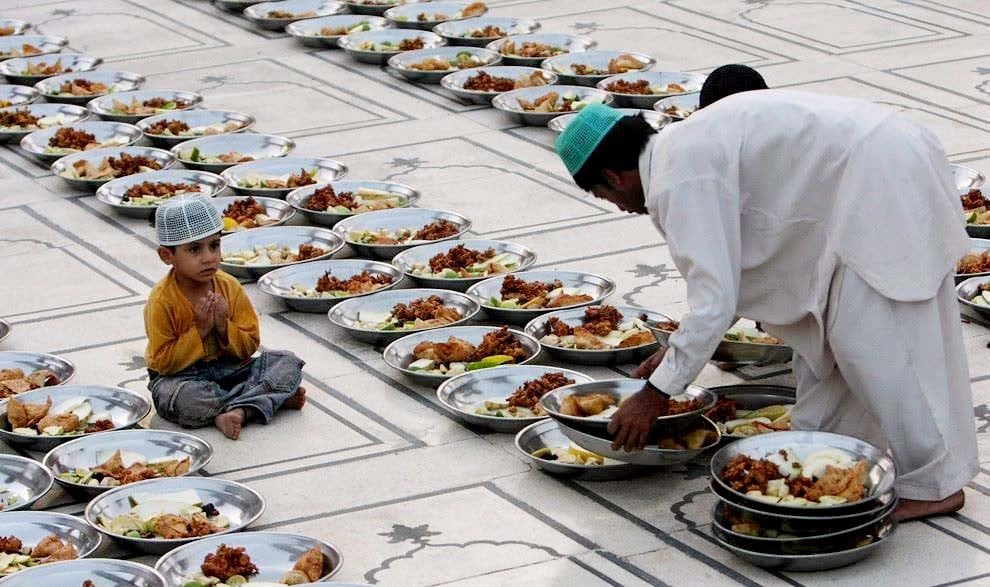
People seem to prefer giving away zakat to the needy in their persona capacity instead of posing their trust in banks

Pakistan, having poor social and economic indicators, tops the list of charity giving countries. This was confirmed in a research study by Aga Khan Foundation in 1998, which revealed that most Pakistanis give away charity or volunteer time every year, amounting to Rs 70 billion. This amount might have increased manifold over the period as Pakistan’s GDP growth has been on an average 4 per cent per annum.
A big part of donations, zakat and sadqa -- in cash or kind -- are given to the needy individuals, neighbours, relatives or families or to the religious organisations or mosques every year by the well-to-do people.
In Pakistan, people pay zakat or other charities like sadqa during the holy month of Ramzan when they calculate their due amount for zakat on their savings and assets. The commercial banks and other financial institutions also deduct 2.5 per cent from the deposits with them, including the profit and loss accounts of those account holders who have not submitted their declaration for non-deduction of the zakat amount.
According to the State Bank of Pakistan, the commercial banks deducted an amount of 4.05 billion on the first of Ramzan in 2014. The data of the current year is still not available. According to the federal ministry of religions affairs, the zakat amount which is collected through banks is ultimately distributed among the provinces according to the population as decided by the Council of Common Interest (CCI). After the 18th Amendment, the funds are distributed by the provinces independently.
Last year, the federal government transferred the zakat share of 53 per cent to the Punjab province, whereas according to the ratio fixed under 1998 population census, Sindh province got 23 per cent, 15 per cent by Khyber Pakhtunkhwa and only 6 per cent by Balochistan. The remaining amount was distributed among Islamabad, Fata, Azad Jammu and Kashmir and Gilgit Baltistan.
The collection of zakat through commercial banks is either steady or declining over the period despite the fact that the size of deposit accounts is increasing. That was after the Supreme Court’s 1999 decision which allowed believers of all the fiqah’s of Islam to declare their faith in an affidavit and get themselves exempted from compulsory deduction of zakat on their deposited amount.
According to the SBP data, the collection of zakat in 2010 was Rs 5.34 billion; Rs 5.5 billion were collected through banks in 2007. "The main reason of declining zakat collection through banks is the lack of trust in the government," says Dr Shahid Hassan Siddiqi, a research scholar and Chairman of Research Institute of Islamic Banking and Finance. People prefer to distribute zakat directly to the needy.
The private sector’s charitable organisations, some reputable hospitals or welfare entities also collect zakat and other donations. Reputable organisations like Edhi Foundation, Chhipa Welfare Association, Alamgir Welfare Trust, Indus Hospital Karachi, Sindh Institute of Urology and Transplantation (SIUT) of Civil Hospital Karachi, Shaukat Khanum Memorial Trust, Layton Rahmatulla Benevolent Trust (LRBT), The Citizens Foundation, and scores of others in different parts of Pakistan.
They often make an appeal to the general public in the media or through other modes of advertisement for donations from zakat, ahead of Ramzan. Some faith-based or community-based charity organisations are also working effectively and efficiently in Pakistan and they also accept donations.
Prominent among them are Al Khidmat Foundation -- welfare wing of Jamaat-e-Islami; Khidmat Khalq Foundation -- welfare organisation of Muttahida Qaumi Movement (MQM), Caritas -- Pakistan’s branch of the international Catholic organisation, Jamiat-e-Punjabi-Saudagaran-e-Delhi, Aga Khan Development Network, Pakistan Hindu Council, etc.
As no official data or record is available to quantify the size of individual charity in Pakistan, it is estimated that at least Rs 400 billion is given away by individuals every year in Pakistan as charity from zakat, sadqa or donations.
Read also: On-screen Ramzan
According to Dr Siddiqi, the bulk of zakat money is given to individuals or relatives or people in dire need whereas a big portion of zakat goes to madrassas, also in an undocumented mode because of the religious belief that charity must be given secretly.
The mechanism of distributing charity money is still primitive and traditional in Pakistan. One can recall that in October 2014 around eight to ten dacoits had looted an Edhi centre in Mithadar Karachi and whisked away five kilogrammes of gold and currency worth Rs 20 million (including some foreign currency).
The money is either deposited as charity or as "amanat" at the Edhi centre, which runs the largest ambulance service in Pakistan, besides running old age homes, orphanages, etc. With such a huge network of ambulance operation across Pakistan the management style of Edhi Foundation is quite inclusive in nature. Maulana Abdus Sattar Edhi is currently ill and his son Faisal and daughter Kubra Edhi are personally handling all finance related operations of Edhi Foundation.
Similarly, many other organisations in Karachi like Chhipa Welfare Association and Sailani Welfare Trust, Alamgir Welfare Trust are some other organisations doing excellent charity work in Karachi city by not only providing free food and ambulances (by Chhipa) and healthcare support and provision of interest-free loans or equipment to youth for starting their own businesses (by Alamgir).
But no audited accounts of these organisations are available. As against these reputable organisations, some other major organisations like LRBT, The Citizens Foundation, or Shaukat Khanum Memorial Trust manage their audited accounts and the details are available on their websites.